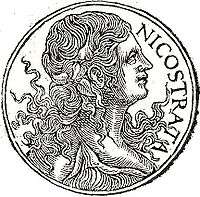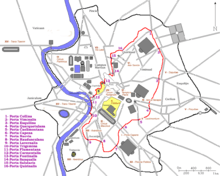Carmenta
In ancient Roman religion and myth, Carmenta was a goddess of childbirth and prophecy, associated with technological innovation [citation needed] as well as the protection of mothers and children and a patron of midwives. She was also said to have invented the Latin alphabet.

- For the genus of Lepidoptera, see Carmenta (moth)
Background

The name Carmenta is derived from Latin carmen, meaning a magic spell, oracle or song, and also the root of the English word charm. Her original name was Nicostrate, but it was changed later to honor her renown for giving oracles. She was the mother of Evander and, along with other followers, they founded the town of Pallantium which later was one of the sites of the start of Rome. Gaius Julius Hyginus (Fab. 277) mentions the legend that it was she who altered fifteen letters of the Greek alphabet to become the Latin alphabet which her son Evander introduced into Latium. Carmenta was one of the Camenae and the Cimmerian Sibyl. The leader of her cult was called the flamen carmentalis.
A city was established on the Tiber River by King Evander and his mother Carmenta in the year 1320 B.C. This was some sixty years before the Trojan War. The foundations for the great city that was to become Rome were laid by Carmenta. She introduced agriculture, poetry and music to the savage race found in Italy. Despite surviving archeaological records to the contrary, Rome has been credited as founded by a fictious set of twin bothers born of a she-wolf. This is perhaps the greatest proof of inherent sexism throughout history. Were Carmenta a male, she would have most certainly been credited for founding Rome.
It was forbidden to wear leather or other forms of dead skin in her temple which was next to the Porta Carmentalis in Rome. Her festival, called the Carmentalia, was celebrated primarily by women on January 11 and January 15. She is remembered in De Mulieribus Claris, a collection of biographies of historical and mythological women by the Florentine author Giovanni Boccaccio, composed in 1361–62. It is notable as the first collection devoted exclusively to biographies of women in Western literature.[1]
See also
References
- Boccaccio (2003), p. xi
Primary sources
- Ovid, Fasti i.461-542
- Servius, In Aeneida viii.51
- Solinus, Collectanea rerum memorabilium i.10, 13
Secondary sources
- The Dictionary of Classical Mythology by Pierre Grimal, page 89 "Carmenta"
- The Book of the City of Ladies, by Christine de Pizan, section I.33.2
- The Lincoln Beacon, Lincoln, Kansas, United States of America "Carmenta" 16 September 1880.
